Car Making Groaning Noise When Reversing?
Groaning noise when reversing could be due to stuck brake pads, uneven brake pads wear damaged sway bar bushing, collision of dust shield with the brake rotor, and broken constant velocity (CV) joints.
Have you heard an worrying groan from your car when you back up? This sound could mean there is a problem with your brakes, transmission or other parts. But don’t worry!
In this helpful guide, I will talk about why your car might groan when going in reverse. I’ll also share how to find the issue so you can fix it. Then your driving will be smooth and quiet again.
Before diving further, I have also written a detailed guide on humming noise from Ford when accelerating. I would highly recommend you check this out as one of the possible reasons for the groaning noise when backing up could also be a damaging CV joint. In that guide, I have talked about it in more detail.
Is your car also experiencing a squeaking noise? Read my guide on the causes of squeaking noises while driving.
Your car may also jerk when shifting from parking to reverse. So, make sure to read that guide as well.
- Worn out or stuck brake pads rubbing against brake discs can cause a clunking sound when backing up. This happens due to overheating and deformation of discs.
- A faulty wear tab on the brake pad touching the brake disc as the pad wears out can also cause noises. The tab indicates when to change pads.
- Dried out sway bar bushings allow too much unwanted movement, potentially causing clunking or groaning when turning or reversing.
- If a retaining clip holding the brake pad is loose, it may move and touch the brake disc, emitting an unpleasant groaning.
- A bent dust shield touching the brake disc can generate a scraping sound when going in reverse.
What Are the Causes of Vehicle Groans When Put in Reverse?
Groaning noise while backing out of driveway is due to the following reasons:
- Brake pads are dragging or worn out
- Faulty wear tab of a brake caliper
- Sway Bar Bushing has dried out
- Retaining clip on the brake is loose
- Dust shield is touching the drum or disc
- A tiny rock has stuck somewhere around the wheel or brake
- Damaged engine mounts and strut mounts
- Damaged CV joint
1. Brake Pads Are Worn or Stuck to The Brake Disc
The most common cause of moaning, grinding or groaning noise from the car when reversing is that the brake pads are worn out or stuck to the brake disc.
When the brake pads rub against the disc (rotor), the disc is heated up by friction.
As the heat builds up, the brake disc expands causing it to deform and rub against the brake pads.
As a result, a loud grinding or grumbling noise occurs. This noise may be very annoying and is often accompanied by vibrations, especially in older cars.
Here is what a user says:
“I have experienced this problem myself with my 2003 Audi A3. When reversing, the rear brakes would make a loud squealing noise. The groan was caused by the word brake pads rubbing against each other. The squeal was so loud that it could be heard even at a distance of about 200 meters! A fix was to replace the word brake pads. Afterward, the squeal did not happen again.”
Why does it happen?
When a brake pad becomes jammed or stuck to the rotor, it also emits a grinding or creaking sound when braking at low speed or reversing.
Brake pads are stuck when there is no grease left in the sliding pins.
Moreover, if your car has metallic brake pads, they will develop the rust, and cause squealing noise from the brakes
In addition, brake pads can also become glazed and have a shiny and glossy appearance on the area where they contact with the brake rotor.
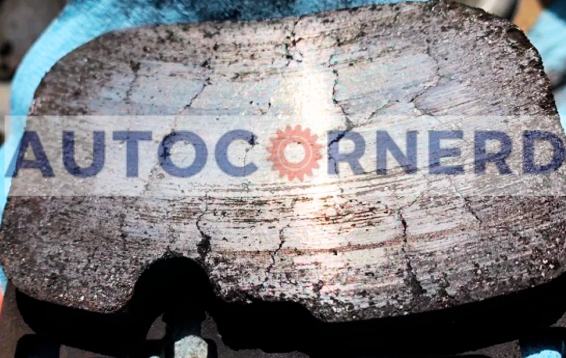
How to fix?
If you have stuck sliding pins, I will recommend Sil-Glyde to lubricate the sliding pins of brake calipers.
Moreover, brake pads and rotors can also develop rust film that can also be the cause of a squealing sound when reversed.
Important note: You should only apply lubricant to the ends of the brake pads and backing plate of the brake pad where it contacts with the brake caliper. Don’t apply lubricant on the friction surface of the brake pads as it will damage them.
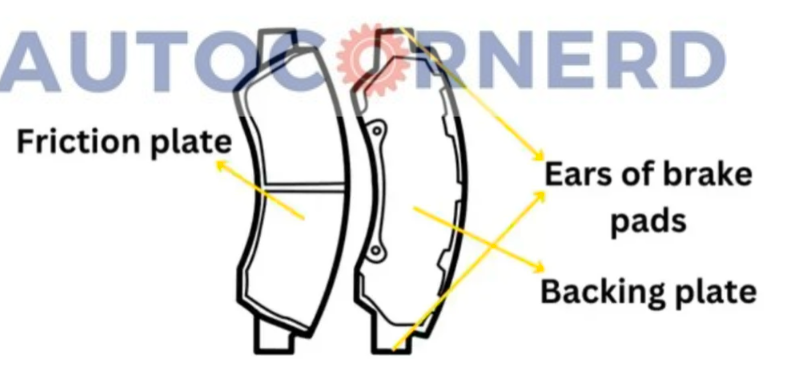
You can use wire brush and brake cleaner to remove rust film from the rotor and brake pads.
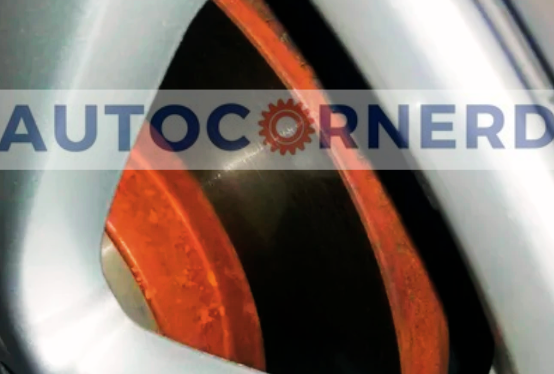
If everything is dry and you are hearing a groaning noise during reverse, it means brake pads need to be lubricated, and if you hear a groaning noise after rain, the moisture buildup develops rust on brakes that could cause whining or groaning noise.
If brake pads are lightly glazed, first wet them with isopropyl alcohol and sand them with 280 to 320 grit sandpaper on a granite stone or concrete slab. You can also try scuffing brake pads on concrete sidewalks or asphalt surfaces to deglaze them.
However, I would advise you to just get new brake pads instead of going through this headache. This is because the brake rotor is quite expensive, and glazed brake pads can damage the brake rotor, which will become quite expensive to fix in the long run.
2. Faulty Wear Indicator tab of a Brake Caliper
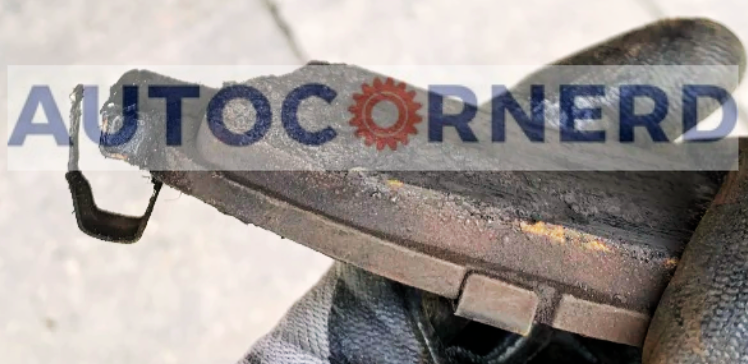
The wear tab on a car brake pad also makes noise when backing up. It can go “mmm mmm” from the car.
On the side of the brake pad there is a small metal flap. It is there to rub on the brake disc to tell you when to change the brake pads.
As the brake pads get thinner the metal flap scratches on the brakedisc, making a squeaky sound when you hit the brakes going backwards.
You can watch the video here – the man tells all about the wear tab.
When the brake pad gets used up, the wear tab is built so it starts touching the disc and goes “wee wee wee” when reversing. That lets you know to get new brake pads.
3. Sway Bar Bushing Has Dried Out
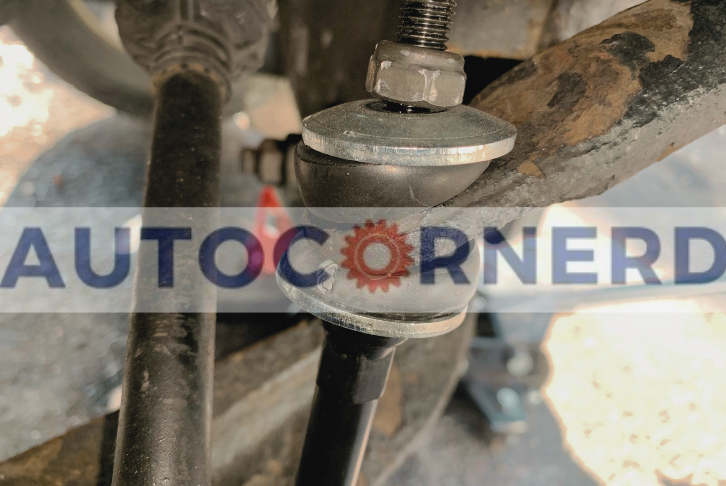
A broken or worn out sway bar bushing can make a groaning noise when you turn or back up your vehicle.
The sway bar helps keep your wheels straight when doing turns or off-roading. It connects to the parts that join the wheel to the body of the car.
When riding on bumpy terrain, the connecting parts will flex so the wheel stays on the ground.
Sway bar bushings are rubber or plastic pieces that are used to reduce shaking.
They act like a pivot for the sway bar so it stays hooked to the frame. If the bushing breaks, it can also cause clunking or squeaky sounds from the car.
I found a video that explains how to replace a cracked rubber bushing. Watching someone do it can help you understand better.
The most recommended bushing for a sway bar is Moog Stabilizer Bar Bushing.
4. Retaining Clip On the Brake Is Loose
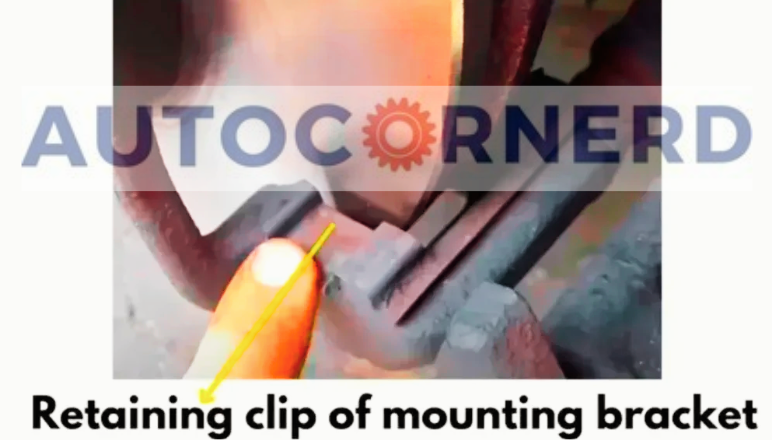
The retaining clip keeps the brake pad from sliding off the disk and into the caliper. It holds the pad in place and helps prevent it from becoming loose and falling off. It is either made of aluminum or steel.
If a retaining clip that snaps into the brake piston is slightly loose, a light brake pedal pressure when reversing a car would often produce the most heinous groaning sound.
However, when you increase the brake pressure, it will go away as the brake pad will firmly squeeze against the rotor.
5. Dust Shield Is Touching The Disc
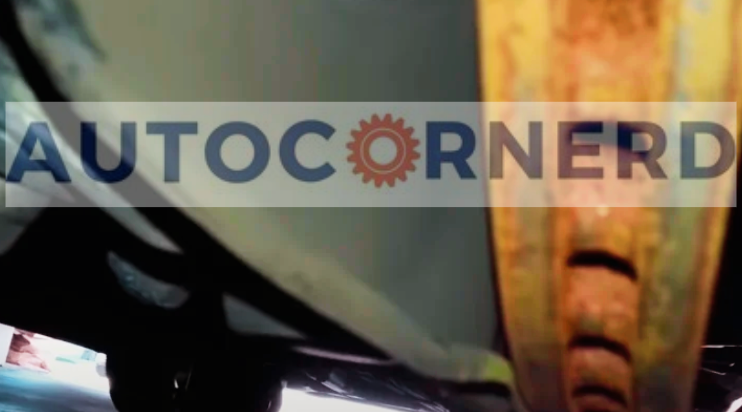
Dust shield can also cause groaning or creaking noise from the car when reversing without applying brakes.
Dust shield is on the back of the brake disc that protects the brake rotors, calipers, and pads by shielding them from environmental particles, such as road grime that can affect braking performance. Dust shield also prevents brake dust from getting all over the suspension components.
Now, the issue with a dust shield is that it is a thin bendable piece of metal. The dusting shield easily bends against the brake rotor and generates a scraping sound when reversing.
6. A Tiny Object Has Stuck Somewhere Around the Wheel

Sometimes a small rock can get stuck between the brake disc and the brake pad. This can cause scratching or squealing noises. The rock presses on the wheel or brake pads and rubs against them.
You may hear a loud bumping sound if the rock is big. Even if you don’t use the brakes when backing up, you will hear the scratching noise when going backwards.
Also look to see if there is any loose plastic hanging below the car that is rubbing and causing scratching noises when going in reverse. The loose plastic could be the reason for the noise too.
7. Bad Motor or Transmission Mounts
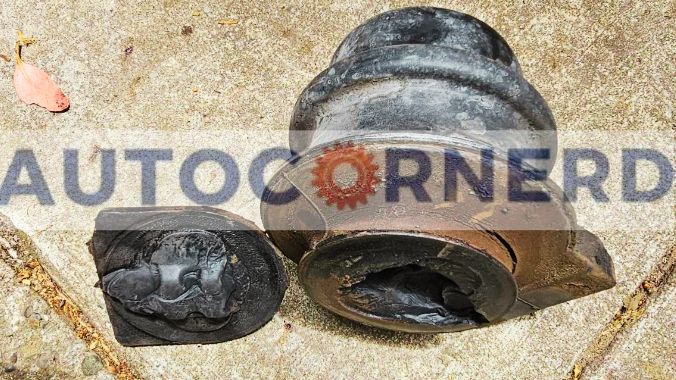
If you are hearing a single loud knock or bang when putting your car in reverse from parking mode like following video, the chances are that the motor mounts are bad.
https://www.reddit.com/r/mechanic/comments/u1cby3/car_makes_this_noise_when_going_into_reverse_only/
Motor mounts are used to reduce and separate the vibrations from the engine from the rest of the car. They usually have rubber cushions that connect in between the engine and the body of the vehicle.
The engine is secured by mounts at the top near the front, on the sides, and at the bottom back. These isolate engine movement and prevent vibration from being moved into the frame:
- Top mounts: Attached at front of engine near where the radiator sits. Limit up and down and side to side movement. Often most likely to break.
- Side mounts: Mount engine to frame or body along the length. Control back and forth movement.
- Rear mount: Holds the back of the engine, often with a hydraulic or rubber cushion to let engine twisting be moved. Lessens engine rolling.
A bad motor mount will look torn or crushed. Motor mounts can become so damaged that they can actually hurt the front wheels on cars where the front wheels move the car.
How to test?
One person was having a loud banging sound when going backwards. He replaced the driver side engine holder and fixed the problem.
Because worn out holders let the engine move around more, tests involve looking at how much the engine wiggles when it is working hard:
- Look and see test: Check for cracks, tears, leaks or if it feels loose. You may need to take some things apart to see better.
- Revving test: Have someone make the engine go a little faster while watching if it is wiggling or shaking too much (make sure the parking brake is on). Do the same with the car in gear and the parking brake on to put more strain on the engine.
- Pry test: Use a long bar to push on the holders and check for cracks or if it moves too much.
Final Thoughts
The groaning sound heard while you put your car in reverse can be caused by a variety of issues ranging from a bad braking system to bad shocks, engine mounts, bad front axle joint (CV joints), and rusted-out wheel hubs.
Brake pads are designed to wear out after a certain amount of use. When brake pads are worn, the brake discs may stick to them and produce noise. When brake pads wear down, they should be replaced. The rotors should also be checked for excessive wear and should be replaced if they’re damaged.
